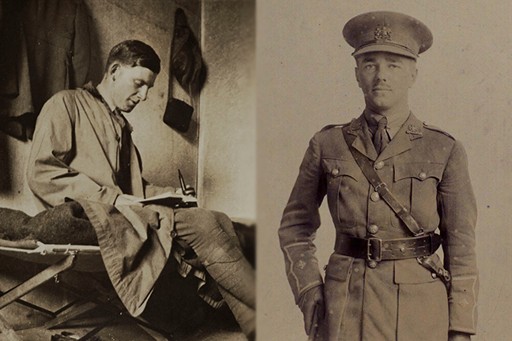3.1.6 Great War poets and shell shock
Below are two iconic poems by Siegfried Sassoon and Wilfred Owen on the subject of shell shock.
Sassoon: Survivors (1917)
No doubt they’ll soon get well; the shock and strain
Have caused their stammering, disconnected talk.
Of course they’re ‘longing to go out again,’—
These boys with old, scared faces, learning to walk
They’ll soon forget their haunted nights; their cowed
Subjection to the ghosts of friends who died,—
Their dreams that drip with murder; and they’ll be proud
Of glorious war that shatter’d all their pride…
Men who went out to battle, grim and glad;
Children, with eyes that hate you, broken and mad.
Wilfred Owen: Mental Cases (1917)
Who are these? Why sit they here in twilight?
Wherefore rock they, purgatorial shadows,
Drooping tongues from jaws that slob their relish,
Baring teeth that leer like skulls’ teeth wicked?
Stroke on stroke of pain, — but what slow panic,
Gouged these chasms round their fretted sockets?
Ever from their hair and through their hand's palms
Misery swelters. Surely we have perished
Sleeping, and walk hell; but who these hellish?—These are men whose minds the Dead have ravished.
Memory fingers in their hair of murders,
Multitudinous murders they once witnessed.
Wading sloughs of flesh these helpless wander,
Treading blood from lungs that had loved laughter.
Always they must see these things and hear them,
Batter of guns and shatter of flying muscles,
Carnage incomparable and human squander
Rucked too thick for these men’s extrication.Therefore still their eyeballs shrink tormented
Back into their brains, because on their sense
Sunlight seems a bloodsmear; night comes blood-black;
Dawn breaks open like a wound that bleeds afresh
— Thus their heads wear this hilarious, hideous,
Awful falseness of set-smiling corpses.
— Thus their hands are plucking at each other;
Picking at the rope-knouts of their scourging;
Snatching after us who smote them, brother,
Pawing us who dealt them war and madness.
Think about the following questions:
- In what ways do these two poems differ? Is there a difference in tone?
- Cast your mind back to some of the themes touched on in the discussion of shell shock in Week 1. What do these poems tell us about the impact of shell shock on ideas about masculinity?
- To whom do you think Sassoon and Owen might be directing these poems?

